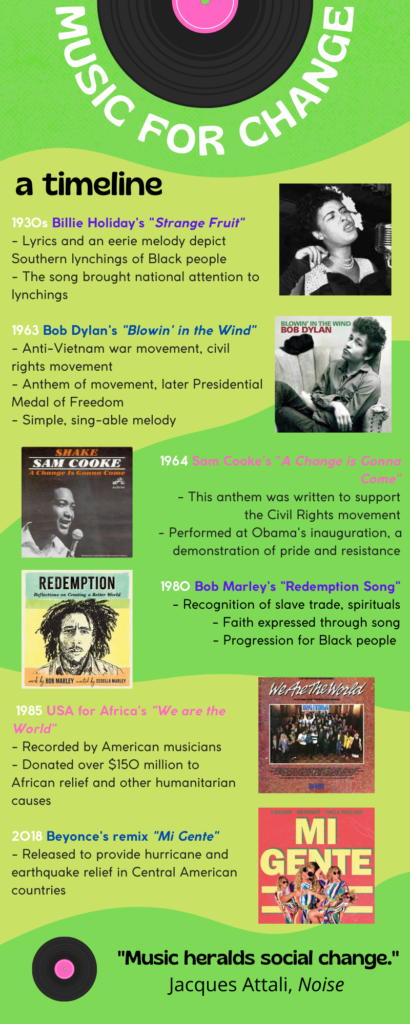

As music theorist Jacques Attali writes in his book Noise, music heralds (positive) social change. Musicians’ impact stretches far beyond the realm of rhythms, harmonies, and tone: their songs affect society and our interactions with our own culture or social issues. Songs revolutionize the way we conceptualize social justice and the change that follows it. Activism that used to be offered in the form of “thoughts and prayers” is now ridiculed, and is replaced by the articulated need for real action—social, political, and economic. And musicians are leading this charge… but this isn’t a new phenomenon.
Music has long been used as a means for encouraging progressive policy. Ever since enslaved persons were singing spirituals as they worked, people were articulating persecution they faced around them and how they dreamed they would combat it in the form of song. But with the popularization of recording devices and mediums in which to share music, music used to promote social justice has risen to gain large-scale attention. Regardless of which social cause artists are advocating for, they spur listeners into action, whether through protest, donations, or other support. Music like this allows for reconsideration and action in favor of social justice issues; slavery and African-American rights, African aid, poverty relief, etc (see infographic).
Given the globalization of new music and media platforms like YouTube and TikTok, we are able to see previously underrepresented artists grow in fame due to online “shares” and the conversations that spark because of them. Higher online engagement musicians’ content and their advocacy for issues increases the attention they is awarded by both listeners and change-makers in office. This online presence was especially effective with Beyoncé’s “Mi Gente” and other songs like “This is America” by Childish Gambino and “Preach” by John Legend. During polarized and tumultuous times, the concrete nature of released music offers solace and comfort, at minimum. But at maximum, music inspires listeners to take up arms, and indicates a real, fixable issue to people who are capable of addressing issues that are sung about.
The effect of musicians speaking, or rather, singing, on cultural issues goes a long way. Music’s effect on social justice is not to be overlooked. The Black Lives Matter and Civil Rights movements were supported on the shoulders of Black musicians and their advocacy through song and allowed for a new platform of power to the people. Music can and should be used for good, and I believe that advocacy through song may be the most effective kind. Not only should artists donate some of their profits to organizations who advance the realization of social justice, but all musicians should recognize the instrumental (wink) role they play in impacting society’s perception of social justice and citizen response to social issues. Music is a powerful tool, and when it is used for the betterment of society — whether via identification of issues, proposal of solutions, or just offering a voice — it is a deeply influential phenomenon.
Attached YouTube video spotlights a non-professional musician’s effort to combat poverty issues by using the proceeds of his and others’ music via Piano vs Poverty to donate to local and global charities.
Sources: